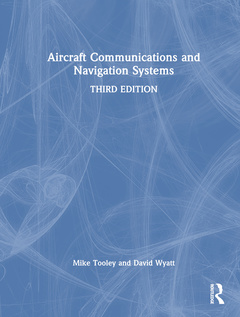Description
Aircraft Communications and Navigation Systems (3rd Ed.)
Authors: Tooley Mike, Wyatt David
Language: English
Subjects for Aircraft Communications and Navigation Systems:
Publication date: 03-2024
· 18.9x24.6 cm · Hardback
Publication date: 04-2024
· 18.9x24.6 cm · Paperback
Description
/li>Contents
/li>Readership
/li>Biography
/li>
Introducing the principles of communications and navigation systems, this book is written for anyone pursuing a career in aircraft maintenance engineering or a related aerospace engineering discipline, and in particular will be suitable for those studying for licensed aircraft maintenance engineer status. It systematically addresses the relevant sections (Air Transport Association of America chapters 23/34) of modules 11 and 13 of part-66 of the European Aviation Safety Agency (EASA) syllabus and is ideal for anyone studying as part of an EASA and FAR-147-approved course in aerospace engineering.
- Delivers the essential principles and knowledge base required by Airframe and Propulsion (A&P) Mechanics for Modules 11 and 13 of the EASA Part-66 syllabus and BTEC National awards in aerospace engineering
- Supports mechanics, technicians and engineers studying for a Part-66 qualification
- Comprehensive and accessible, with self-test questions, exercises and multiple choice questions to enhance learning for both independent and tutor-assisted study
- Additional resources and interactive materials are available at the book's companion website at www.66web.co.uk
This new and updated third edition provides readers with an overview of the latest key technologies that underpin the functioning of safety-critical systems such as those used in flight management, reporting, navigation, and air traffic control.
1. Introduction. 2. Antennas. 3. Transmitters and receivers. 4. VHF communications. 5. HF communications. 6. Flight-deck audio systems. 7. Emergency locator transmitters. 8. Aircraft navigation. 9. Automatic direction finder. 10. VHF omnidirectional range. 11. Distance measuring equipment. 12. Instrument landing system. 13. Doppler navigation. 14. Area navigation. 15. Inertial navigation systems. 16. Global navigation satellite systems. 17. Flight management systems. 18. Weather radar. 19. Air traffic control systems. 20. Traffic alert and collision avoidance systems. 21. Electromagnetic compatibility.
Mike Tooley has over 30 years’ experience of teaching electrical principles, electronics and avionics to engineers and technicians, previously as Head of the Department of Engineering and Vice Principal at Brooklands College, Surrey, UK. He currently works as a consultant and freelance technical author.
David Wyatt has over 45 years’ experience in the aviation industry. After a technician apprenticeship in BOAC he progressed as a development engineer at BA. After a period as an avionics engineering lecturer in further education, David went on to become Head of Airworthiness at Gama Aviation. David is the author of several popular books in the Routledge Aircraft Engineering Series.




